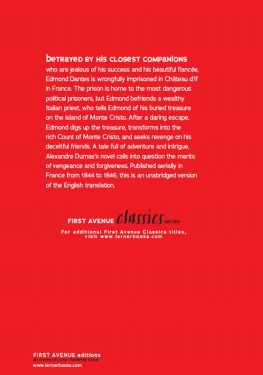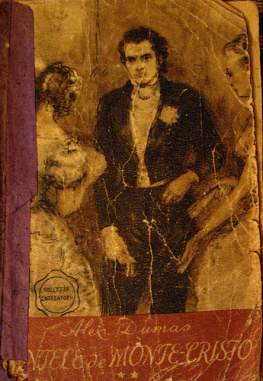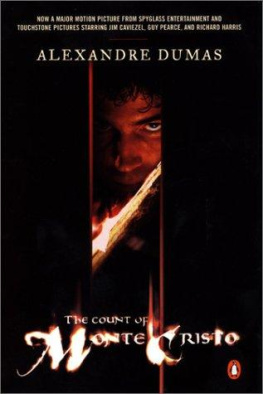Alexandre Dumas
THE KING OF ROMANCE
F. W. J. HEMMINGS

Contents
Alexandre Dumas inherited a surname already made famous by his father, a general in the armies of the First Republic, but not borne by his fathers father, who was called Alexandre-Antoine Davy de la Pailleterie. The question how the name Dumas came into the family leads straight to the heart of an obscure and tangled imbroglio with all the elements of sibling rivalry and long-lost heirs that the novelist himself, had he had any inkling of it, would have recognized as a heaven-sent plot for one of his own best-selling romances.
The Davys were an old but undistinguished and not very well connected family of Norman squires, who had held the manor of La Pailleterie uninterruptedly since about the middle of the sixteenth century; the first Sieur de la Pailleterie, a certain Pierre Davy, died around 1575. It was his great-grandson in direct line of descent, one Alexandre Davy, who became lord of the manor in 1709 and, marrying shortly after, founded a family of three sons and three daughters, the eldest being the aforementioned Alexandre-Antoine, the novelists grandfather, born in 1714. The rules of primogeniture as applied in eighteenth-century France meant that it was this boy who could be expected to inherit the greater part of the estate at the death of his father; but there is little doubt that the fortunes of the family would have been better entrusted to his brother Charles, born two years later. Alexandre-Antoine was a feckless voluptuary, though not devoid of acumen where his private interests were concerned. Charles, on the other hand, was an energetic, enterprising man, extremely ambitious and prepared to work hard to see his ambitions fulfilled.
Both boys, as soon as they were of age, joined the army. Neither had any inclination to enter the Church, and to take the kings commission was, under the ancien rgime, about the only respectable alternative for the sons of the minor nobility. Alexandre-Antoine became an officer of artillery; Charles joined a brigade of marines destined for service in the French colony of San-Domingo. This was tantamount to a decision to emigrate. Although barely turned sixteen, Charles felt he could never stand the tedious and narrow life of a regimental officer stationed at home; he had visions of settling overseas as a gentleman farmer or merchant venturer, and eventually building up a fortune.
The island of San-Domingo, today divided between the Dominican
Charles Davy spent his first six years on the island eating his heart out as a penniless subaltern; without capital, he saw no possibility of starting any of the business enterprises of which he dreamed. Then his opportunity came: he proposed marriage to a young woman with tide-deeds to a sound property, and was accepted. Marie Tuff, born in San-Domingo, was an orphan; the sugar plantation she owned was situated at a spot called Le Trou de Jacquezy, in the north of the island. By the strangest of chances, the nearest township boreand bears to this daythe name of Monte Cristo which a century later his grand-nephew was to make famous throughout the world when he incorporated it in the tide of one of his most widely read novels. Alexandre Dumas, however, was not thinking of this remote spot in the Dominican Republic, of which he quite possibly had never heard, but of a tiny Mediterranean island just south of Elba.
The same year that Charles got married his elder brother, Alexandre-Antoine, having resigned the service, arrived in San-Domingo ostensibly to help the younger run his estate. The newly married couple made him heartily welcome at first. The life led by the white planters was a harsh and often lonely one. They were obliged to spend most of the year on their estates, since the raising, harvesting, and processing of the crops needed constant attention. With the horse-drawn cart the only method of transport, visits to any of the larger towns involved several days travel, and were in consequence only undertaken for pressing reasons of business, to arrange the sale of produce or to purchase a fresh batch of slaves in place of those that had died under the overseers whips. Journeys were, in any case, never lightly to be embarked on, since anywhere along the road the traveller risked being ambushed by bands of marauding maroons, escaped slaves who had taken to the hills and resisted all the attempts of the militiamen to ferret them out and exterminate them. Whether working in gangs on the plantations or hiding in the jungle, the blacks outnumbered the whites ten to one, and the latter were able to stay in control only by the use of intimidation and systematic brutality.
As a general rule they kept strictly aloof from the slaves who worked in the fields or performed domestic duties indoors. Racial segregation was official policy, and had indeed been enshrined in the Code Noir, the French law regulating conditions of work and life in the colony. But there must always have been some Europeans who disregarded its provisions, since otherwise there would be no explaining the presence on the island of a sizeable population of mulattoes, hated by the blacks because they were widely employed as slave-drivers, and looked down on by the white landowners, the grands blancs, because of their mixed origins.
Over the ten years during which the brothers Davy lived and worked side by side in San-Domingo, the younger, Charles, grew steadily richer and more respected, patiently adding one pice of land to another until his plantation became one of the most important in that part of the island; while the elder fell into habits of indolence and, worse, started fraternizing with the blacks on the estate. Dissension between the two brothers flared into a sudden, violent quarrel in 1748. If they did not actually come to blows, enough was said to cause Alexandre, the weaker character, to take fright. Secretly, he made off into the hinterland, taking with him three of his brothers slaves, two negroes and a woman who went under the offensive name of Catin (whore).
Charles alerted the authorities, and an official inquiry was set afoot; but in this ill-policed colony a man who wanted to disappear had no real difficulty in doing so. Up to a point he felt relieved at being rid of his lazy, good-for-nothing brother; but the fact remained that Alexandre was the elder, and Charles could not help worrying about what was likely to happen at their fathers death if the rightful heir were still absent.
Meanwhile, he continued as before, extending his holdings by careful purchase until, in 1752, an inventory shows him to have owned no fewer than 191 slaves (114 male, 59 female, and 18 children under age). Shortly afterwards, however, he developed gout. The medical advice was that he could only mend in a more temperate climate, and accordingly he returned to France with his family, leaving a steward in charge of his sugar plantation. He bought an estate near Montargis, just south of Paris, established his right to the title of marquis, and when, five years later, in 1758, his father died at the ripe age of eighty-four it was Charles who, his brother being now presumed dead, entered into possession of the ancestral title and lands.
Materially, however, his fortunes had passed their zenith. Since his arrival in France, the profits from the sugar plantation had steadily fallen off; other business ventures turned out badly, while the purchase of the Montargis estate and a town-house in Paris ate deeply into his savings. He had one final triumph: his only child, a daughter born in San-Domingo, was asked for in marriage by a man belonging to the highest aristocracy, Comte de Lon Maulde. The marriage contract was signed at Versailles in the presence of the royal family. None of the Davys had ever risen to such dizzy social heights before. But Charless satisfaction was short-lived. Financial disasters continued to beset him until, regretfully, he decided to return to his neglected estate at Le Trou and try to use it as a basis for restoring his fortunes. It was in 1771 that he returned to the colony; two years later, a final attack of his old illness carried him off.





